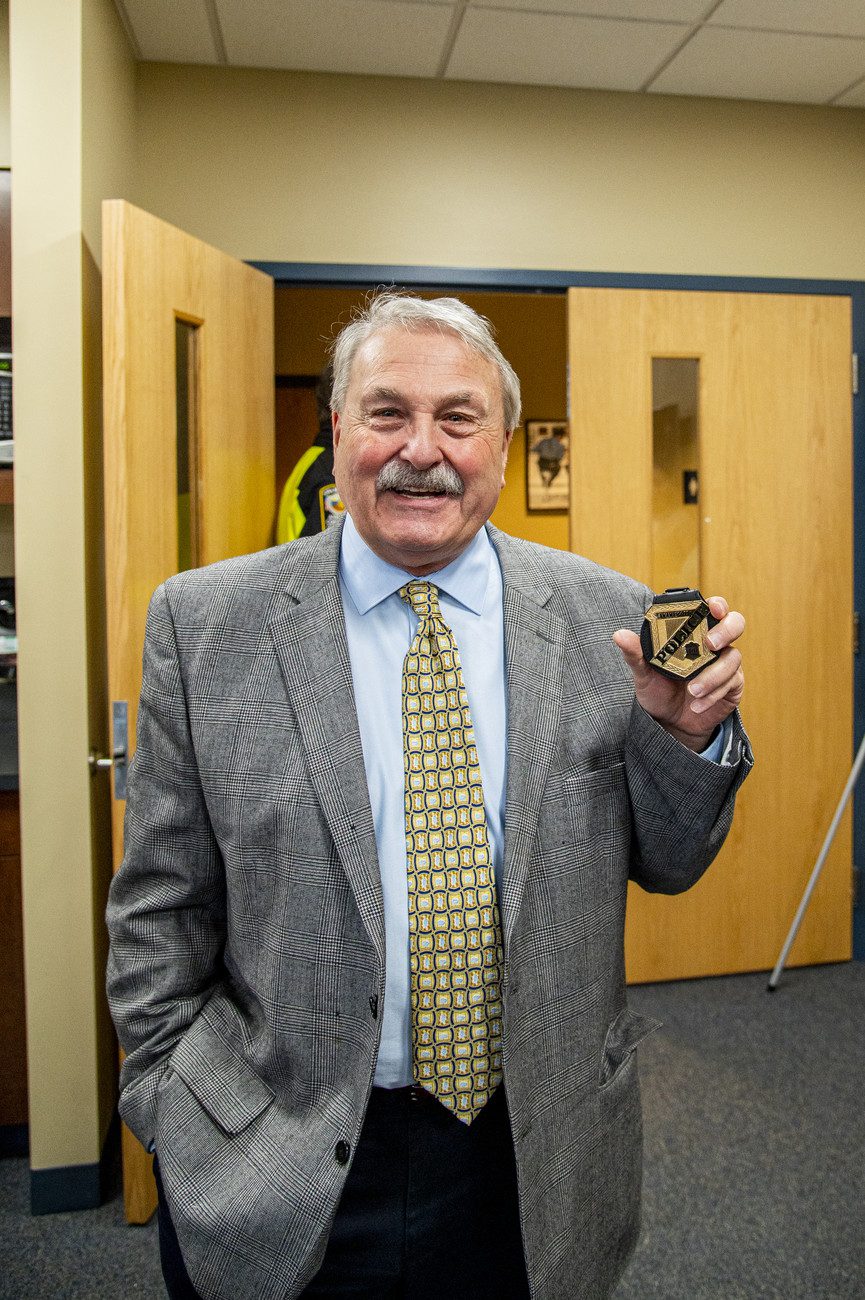SWAMPSCOTT — The Police Department bid farewell on Monday to interim Chief David Kurz, who has spent the last nine months in the town leading the search for the new permanent chief and shaping a new hiring process for police officers outside of civil service.
The Police Department threw a celebratory lunch with a cake for Kurz.
“I don’t know if it is a celebration of what I have done or that I am going,” said Kurz, who, as many in the town have noticed, likes to joke.
Officer Kevin Reen presented Kurz with a police chief’s badge on behalf of the whole department.
“We are wholeheartedly grateful for the opportunity to have been mentored and guided by you,” said Reen. “We came to a consensus that, although you are leaving, you will always be with us.”
Kurz described his time in Swampscott as “nothing short of joy,” saying that the town’s police department is engaging, compassionate to the community and committed to doing the right thing.
“You just made it so simple for me to guide you and work with you,” said Kurz.
Capt. Joseph Kable said that working with Kurz was one of the best experiences of his professional career in law enforcement.
“He is an amazing man,” said Kable. “I wish I had met the guy 20 years ago in my career and not only for nine months.”
A lot of people in the department were anxious about leaving civil service, said Kable, but Kurz showed them the opportunities it entailed.
Detective Ted Delano said that, during his time at the department, Kurz brought a lot of attention to having the community’s best interest and building public trust, which helped to reinforce the existing relationships. Kurz organized discussions of civil-rights cases, brought in leadership training and talked about officers’ wellness and health.
Kurz started in Swampscott at a difficult time, said Reen, when a lot of things were going on both in the town and nationally. Kurz had the knowledge to help the department implement the ideas that they shared.
He demonstrated to the officers how important the department’s accreditation is and how utilizing the policies and procedures to a “T” is going to make them the most professional agency that they can be, Reen said.
“Chief Kurz helped introduce his methodology in how to utilize all the information that is out there for policing, find what fits our department best, put that at the forefront so that we can then bring it back to the community and give the community everything that they deserve from us,” said Reen.
“He has definitely left a lasting impression on our officers,” said Detective Candace Doyle, pointing out Kurz’s wisdom and knowledge in policing.
Dr. Ruben Quesada, the new Swampscott police chief, said having Kurz was invaluable because he has been focusing on providing leadership traits and sharing what he has learned in his almost 50-year career.
“It is not about the money for him or the notoriety,” said Quesada. “He does this because he believes in the police department and he believes in what we are doing here.”
Kurz served as Swampscott’s interim chief through a contract with Municipal Resources, Inc. (MRI), based in Meredith, N.H. He was charged with leading the process of finding a new permanent police chief after former chief Ronald Madigan retired in July 2021.
Kurz, who grew up in Saugus, began his career as a police officer in Gorham, Maine, where he was able to join the department outside of civil service. He eventually became the chief of that department and the deputy director of the Maine Drug Enforcement Agency at the Maine Department of Public Safety.
From 1996 to August of 2020, Kurz served as chief of police for Durham, N.H. He was one of 12 chiefs appointed by the International Association of Chiefs of Police (IACP) to serve on an advisory group assisting in the formation of training and client needs assessment that may be unique to smaller police agencies in the United States.
Kurz has written articles for the IACP’s “Police Chief” magazine and the “Big Ideas for Smaller Agencies” newsletter focusing on strategic planning, alcohol enforcement, promotional process, effective performance evaluations, leadership and new technology acquisition.
Some of his writings were cited or included in President Barack Obama’s “Task Force on 21st Century Policing” report.

